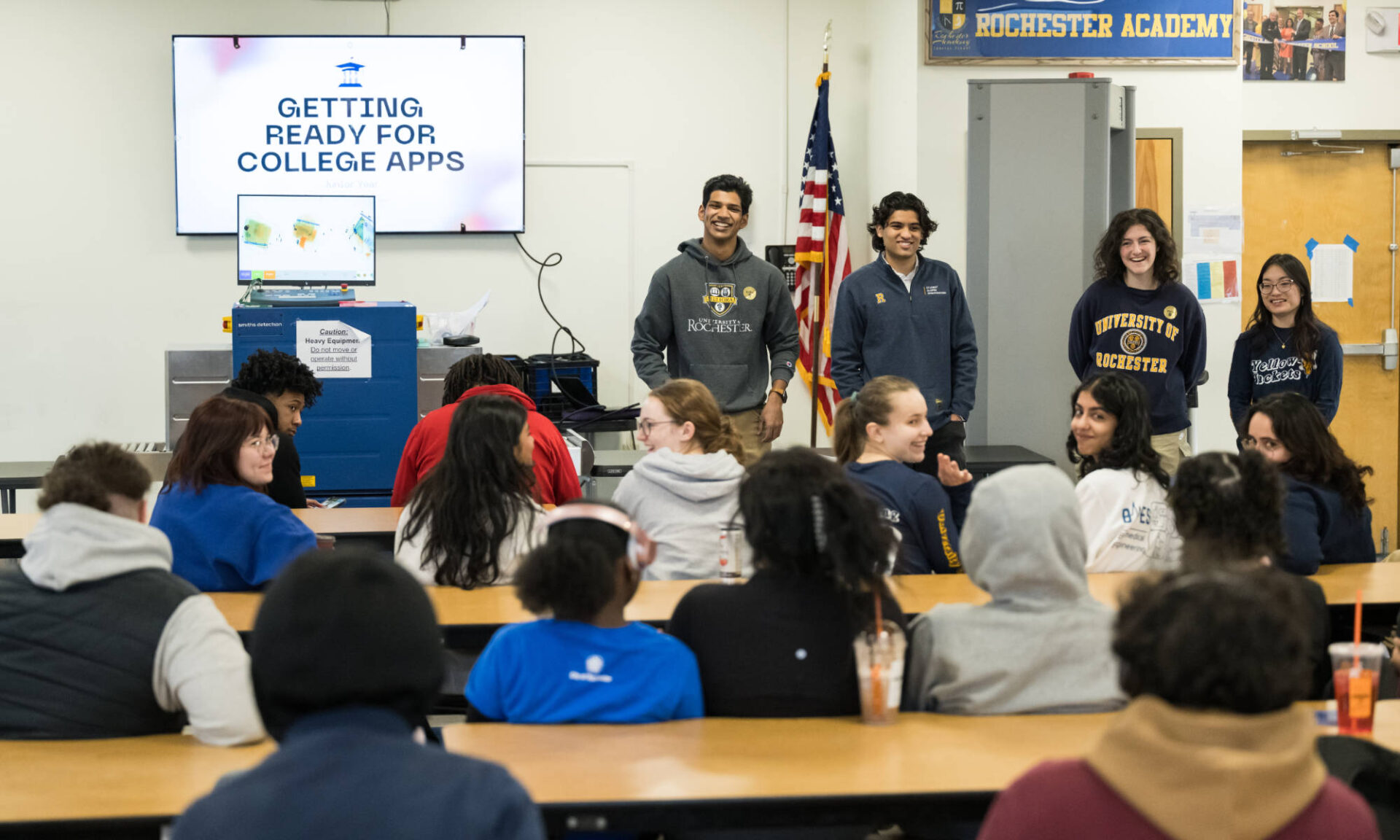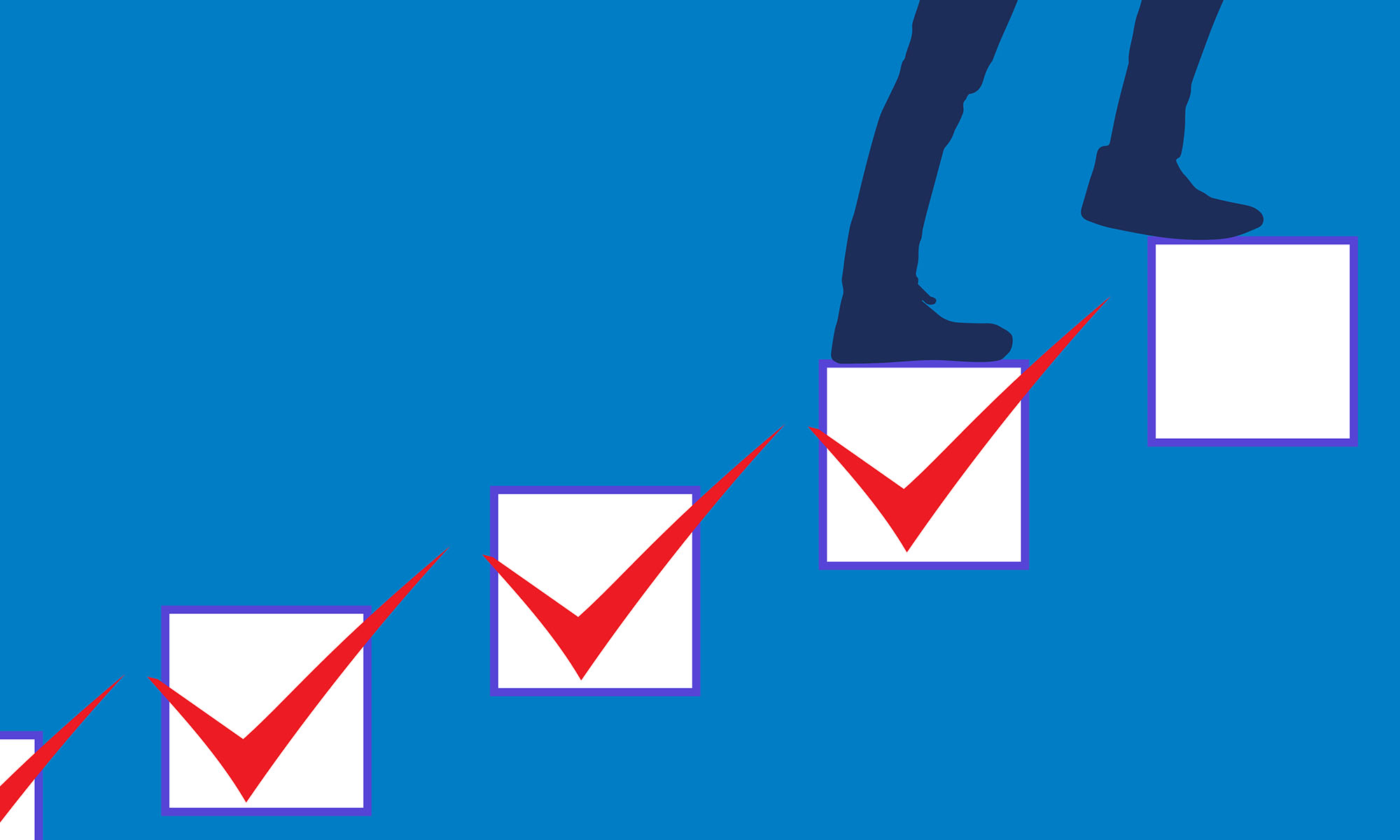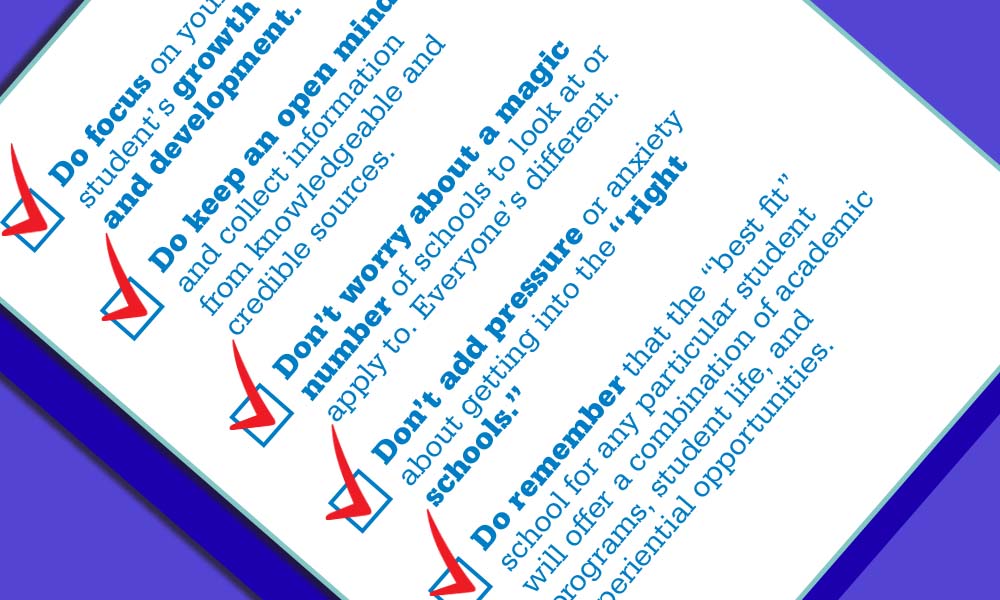A trio of undergraduates teamed up to bring accessible, high-quality education consulting services to the community. Now, they’re branching out beyond Rochester.
Two years ago, Adarsh Mavathaveedu ’24 was helping his younger brother fill out college applications back home in Flemington, New Jersey, when he came to a realization.
“I could provide him with an abundance of resources and guidance—resources I wish I had when I was in high school,” the University of Rochester neuroscience major says. “But being the eldest child in an immigrant family, I had navigated the process alone. I thought, ‘What if there was a way for my brother, and students like him, to get free advice?’”
Mavathaveedu was a teaching assistant in a biology class at Rochester when he pitched his idea to Hana Zhang ’26, a health, behavior, and society major from Westbury, New York, and Keira Donnelly ’26, a neuroscience and psychology double major from Victor, New York.
“Together, we founded Project Level the Field,” Mavathaveedu says. “Our motto is ‘making college applications ever better.’” (A take on the University’s motto of Meliora, meaning “ever better”).
The rise of educational consultants in college admissions
Free advice to aspiring college students is available online, although finding it and applying it without assistance or guidance from someone more familiar with the college application process in the United States can be challenging. There are also numerous independent educational consultants, or IECs, available nationwide who work one-on-one with students. But that is a costly venture: According to data from the Independent Educational Consultants Association, most IECs charge more than $4,000 per year for services, with some as high as $40,000.
The IECA reports that there were about 1,500 full-time independent educational consultants in 2010, and that number has skyrocketed to nearly 10,000 this year, with an estimated additional 10,000 to 15,000 working part-time. The reasons for the influx include the increased cost of higher education, overworked high school counselors, and changing trends in college admissions that started, in part, with the introduction of the Common Application in 1975. A generation or so ago, test scores and grade-point averages were the key determining factors. Now, many colleges and universities, including Rochester, place less emphasis on standardized test scores and take a more holistic approach when making admissions selections.
“Over the years, the college admissions process in the United States has become increasingly complex, in part because students are applying to more colleges,” says Jason Nevinger, Rochester’s senior director for admissions. “The increased application volume, coupled with the non-standardized approach to how admissions offices manage their application process—the use of standardized testing, and various application plans such as Early Decision and Early Action—has resulted in more families turning to paid educational consultants to help navigate the college admissions process in hopes of gaining an edge. But, in general, it’s those families with the financial means that can afford them.”
Making the college application process more accessible
Mavathaveedu, Donnelly, and Zhang created a program that would “level the field,” giving underrepresented and first-generation students the guidance needed to successfully undertake and complete today’s college application process, which generally includes writing a long-form essay, compiling a resume or list of activities, securing letters of recommendation, and providing a high school transcript.
Project Level the Field currently has 12 volunteer student mentors—10 from Rochester, one from the New Jersey Institute of Technology, and one from North Carolina State. “We connected with the non-Rochester students through LinkedIn,” Mavathaveedu says.
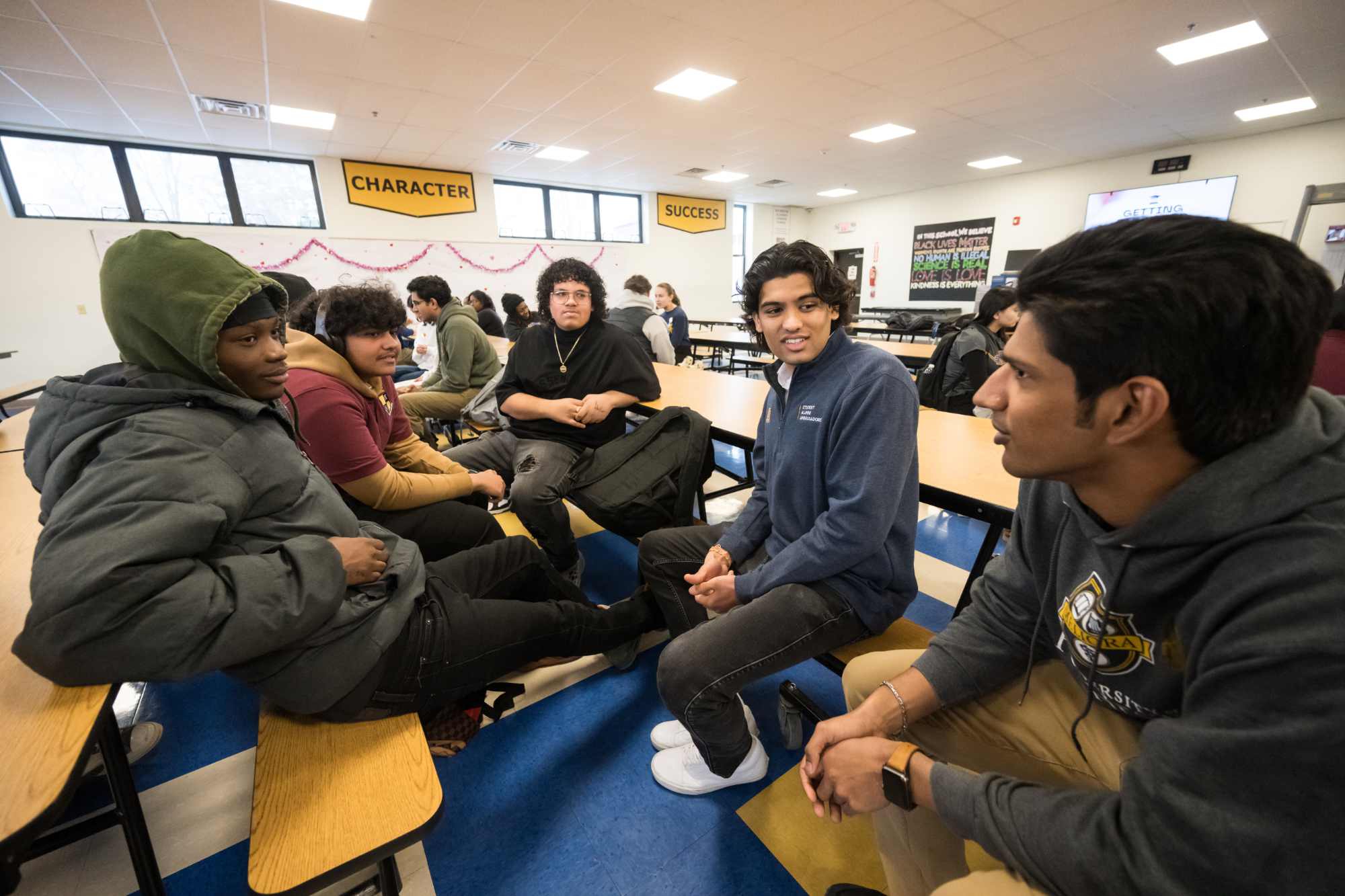
The group’s mission is to ensure that everybody has free, high-quality college application resources regardless of race, ethnicity, or financial status. Like paid educational consultants, the Level the Field students—who refer to themselves as mentors—provide various services, including resume-building, college essay editing, interview training, and financial aid assistance. As part of the mentoring process, they also help participating high school students research and compile a list of potential colleges to which they might apply.
Project leaders reach out to high school guidance counselors, offering in-person or remote one-on-one sessions. They also promote their volunteer work on the group’s website and Instagram (@projectlevelthefield). Outreach efforts and events have taken place at many Rochester area high schools, but mentors also have advised students at their former high schools.
“It’s all about giving back,” Mavathaveedu says.
So far, more than 150 high school students—mostly from the Rochester City School District—have participated in the program, with students being accepted to a range of higher education institutions. Mavathaveedu says mentees have been accepted to Ivy League schools like Cornell University and selective universities including Rochester, Penn State, Notre Dame, Rutgers, and Syracuse, as well as community colleges and small liberal arts colleges.
The group plans to add around 20 new mentors from Rochester and one from Johns Hopkins University in the coming year, and recently filed paperwork to become recognized as a non-profit organization, which would further expand their reach. They are expanding considerably even as Mavathaveedu, who conceived the project, prepares to graduate in May.
Leveling the field at Rochester while expanding beyond
Zhang, the daughter of immigrants, says Project Level the Field was appealing because she wanted to make a difference in the lives of students who mirrored her own experience.
“I was scared to reach out for help when I was applying to college,” she says. “I didn’t share my admissions essay with anyone because I didn’t want to be judged. If I didn’t get in, I felt people would see me as a failure.”
Zhang feels strongly connected to the students she mentors because she is not far removed from what they are currently experiencing. “When we first went to East High School [in Rochester], I was a year older than the students,” she says. “I could empathize with their experiences and hardships.”
Last November, Project Level the Field cohosted a pre-medical symposium on the University’s River Campus with the Rochester fraternity Sigma Phi Epsilon. The event included representatives from the University’s Office of Undergraduate Research, the Greene Center for Career Education and Connections, the Minority Association of Pre-Medical Students, and others.
More than 160 University of Rochester undergraduates attended.
“Level the Field has a great mission with a great cause,” says Jonathan Bratt, a senior career advisor at the Greene Center who took part in the symposium. “They saw a need and developed a way to support and encourage high school and college students needing guidance to navigate the entire application process.”
Even with Mavathaveedu graduating, Project Level the Field’s other founders are excited about expanding beyond Rochester.
“We want to establish new branches where some of our mentors are affiliated,” Donnelly says. “While the project originated in Rochester, its missions and values transcend the confines of any single community. We know it’s going to be difficult without Adarsh here. He’s been an accessible and insightful mentor, integral to our journey.”
Donnelly adds, “The greatest challenge lies in the uncertainty of the future, but as a team, we love to be challenged, and cannot wait to see how Level the Field will grow in the future.”
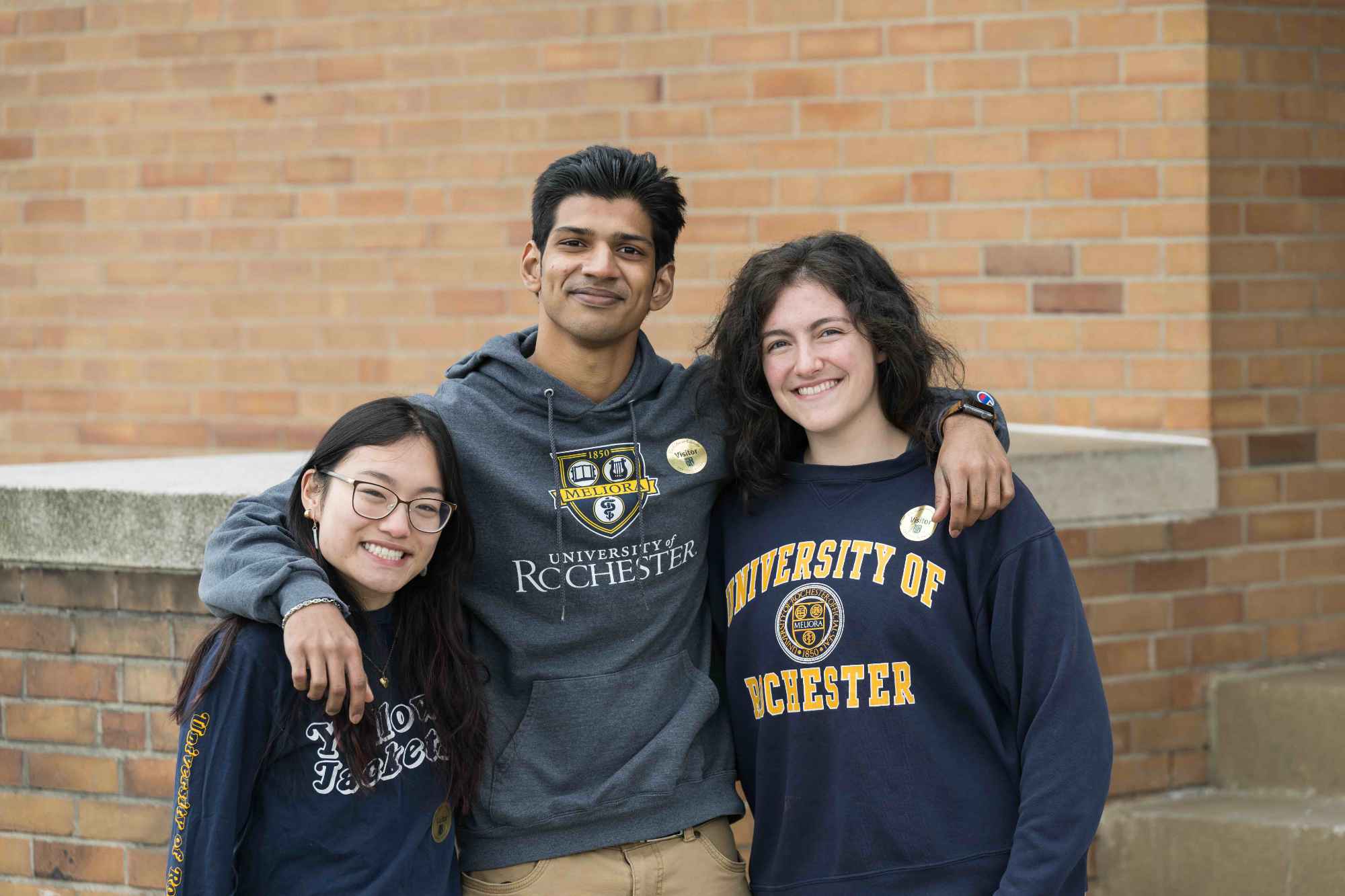
Tips from Project Level the Field’s student educational consultants
The founders of Project Level the Field—Keira Donnelly ’26, Adarsh Mavathaveedu ’24, and Hana Zhang ’26—offer tips for high school students interested in applying to college.
Opt for Quality over quantity.
High school students often engage in a “resume war,” feeling the need to participate in activities they may not be interested in simply because they see others doing so. When they compare themselves to their peers, they may unnecessarily feel like they are falling behind. In reality, everyone has unique qualities, and individuals should participate in extracurricular activities they are passionate about. This ensures that not only do you spend time doing things you love, but that it also translates well for the application process. A well-documented commitment to a few select activities you love speaks louder than a long list of superficial engagements.
Take a break.
Many students neglect their physical and mental health during the college application process. We can only produce our best work when we’re feeling our best. This means actively protecting our health by scheduling periodic rest days, eating well, exercising, and spending time with family and friends.
Note, too, that there is rarely an ideal time to start writing the oft-required college application essay. Often, the stress of writing the perfect essay discourages and delays the writing process. However, some clues may indicate that you should take a break. For example, if you feel a mental fog, or if you’re having trouble staying awake or concentrating, it’s time to take a break. Go for a walk, take a nap, clear your head, and come back.
Similarly, your environment can play a big role: We recommend finding an area with minimal distractions, natural lighting, and a setting that allows you to work well.
Keep an open mind.
A rigid mindset can prevent you from exploring schools and limit your application pool. College is largely about taking risks and discovering yourself, so don’t hesitate to take those same risks during the application process and try new things. Many of us were so focused on the prestige of Ivy League schools that we overlooked the incredible opportunities at other institutions, both nationally and internationally. Many colleges offer equally valuable educational experiences regardless of their acceptance rates. Taking risks means considering schools in unexpected locations. Sometimes, the place we least expect to find ourselves is where we truly belong.
Stay true to yourself.
You will attend the college you choose, not anyone else. Find a school that meets your criteria with regard to academics, cocurricular opportunities, athletics, and more. Visualize your ideal college experience, considering both social and academic aspects. Ask yourself: “Are there social organizations that represent my identity and beliefs? Are there student clubs tailored to my hobbies and interests? How does this university handle on-campus conflicts?” It is crucial to select a place that not only fosters personal growth but also provides a safe space to do so. The more you explore—reading about students’ experiences posted on the admissions site or elsewhere online, meeting with current students, and eventually attending admitted student day—the better you can determine which college is the right fit for you.


